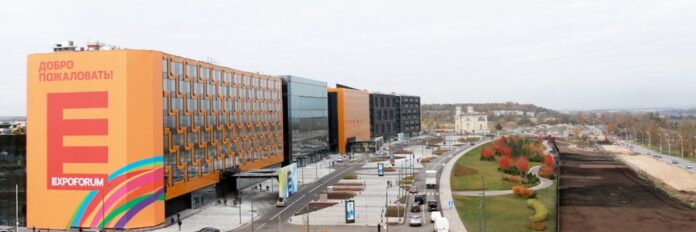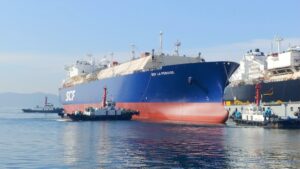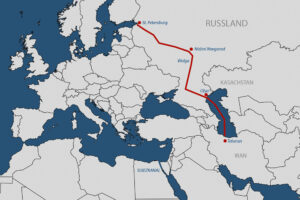
With a certified safety and hygiene system, the maritime fair and conference »Neva« is to take place in St. Petersburg from 21 to 24 September in order to connect the Russian and the international shipping and ship technology industry
Neva believes in live and safe communication.« With this words, the organisers of the most importa[ds_preview]nt Russian maritime fair recently signed an announcement of the event. It addresses the circumstances of the Corona pandemic and how the Neva is adapting to the situation. A special QR code confirms compliance with all sanitary and epidemiological standards established by the federal authorities of Russia. The ExpoForum Convention and Exhibition Center, where the Neva is held, also has a similar QR code.
In the context of the pandemic, organizations that carry out exhibition activities must undergo an official procedure for obtaining a QR code with the Safe Travels SPb sign, which confirms compliance with all safety standards. »This practice is successfully applied in St. Petersburg and, undoubtedly, indicates a decrease in the morbidity rates in the city«, it was said.
According to the statement, the guidelines for organizing public events were developed »with the participation of industry representatives« and take into account the specifics of convention and exhibition activities: »Business events are different from sports shows or music concerts, where the number of people and their presence in one place is difficult to control«. The organizers of so-called MICE events – Meetings Incentives Conventions Exhibitions – are said to be able to control the presence of visitors on the site, observe medical safety, and predict attendance with the help of engineering services, technological solutions, and the implementation of a clear schedule.
In 2020, Neva-International introduced mandatory and updated solutions to meet the standards of safe operation. The business program has been made with respect to the need for increased social distance, breaks for disinfection and mandatory comprehensive cleaning before and after each session. ExpoForum has organized buffer zones on the sites as well as vending machines with personal protective equipment (masks, gloves).
In addition, contactless »remote registration« is organized for visitors and participants of the exhibition and modern non-contact thermal imagers are used to measure the temperature.
International projects

The Neva has a not insignificant role for the maritime industry, among other things to link the Russian industry with the international industry. For the latter, the more or less extensive political plans from Moscow offer some sales opportunities.
Not only, but also Russian shipbuilding has recently attracted attention with interesting projects, flanked by government measures to modernise the maritime infrastructure. New or modernised transhipment centres are being built, the fleet especially for the Arctic regions is being built up and expanded with new tankers. Within the framework of these measures, there are also repeated opportunities for international financing partners. For example, the German state development bank KfW Ipex is involved in financing LNG tankers for the Russian shipping group Sovcomflot (SCF), which is also state-owned.
On course to the Far North
The Russian authorities have a special focus on improving the maritime development of the Arctic waters. On the one hand, the Northern Sea Route (NSR) is enormously important for the exploration and transport of raw material deposits. On the other hand, the sea route is also repeatedly brought into play for »other« ship transports between Asia and Europe, be it for tankers, bulkers, container ships or not least project cargo vessels, which transit the NSR already from time to time. However, there is still some way to go before more or less regular services can be realised.
It is also about the uninterrupted supply of goods for the population and the economy in the far north. However, for Russia modern ships, maritime safety facilities and, last but not least, transhipment sites and ports are still needed for this challenging sea region.
Accordingly, the state is committed to pushing ahead with modernisation. In spring, for example, Moscow announced that it would subsidise newbuildings with up to 15 % of the investment sum if they were used in the NSR. Prerequisite: shipbuilding contracts for Russian shipyards.
The state-owned corporation Rosatom had recently brought in the Arab terminal and logistics group DP World as a partner to advance the development and operation of transport and logistics capacities along the Arctic route.
A completely new route?

Most recently, another new initiative went public: With transports from the Caspian Sea to the Baltic Sea, bypassing the Suez Canal, Moscow could revive an old shipping route. The driver of the new project is the head of the Russian shipbuilding company United Shipbuilding Corp (USC), Alexei Rakhmanov. He wants to build river-sea ships that could bring containers from the Caspian Sea in the south of the country via the Volga-Baltic Waterway and the Neva to St. Petersburg on the Baltic Sea.
He presented the plans for this north-south corridor at a recent meeting with Russia‘s President Vladimir Putin. The transit time is said to be 7–8 days – significantly shorter than the route via the Suez Canal, the Mediterranean, the Atlantic, the North Sea and the Baltic Sea. In addition, the route runs exclusively over Russian territory, so it would be »free of foreign influence«. According to Rakhmanov, the construction work for a new type of container ship will begin this year.
The country‘s maritime industry should also ultimately benefit from this – and possibly the international industry as a partner, too. This will certainly be discussed at Neva.
















